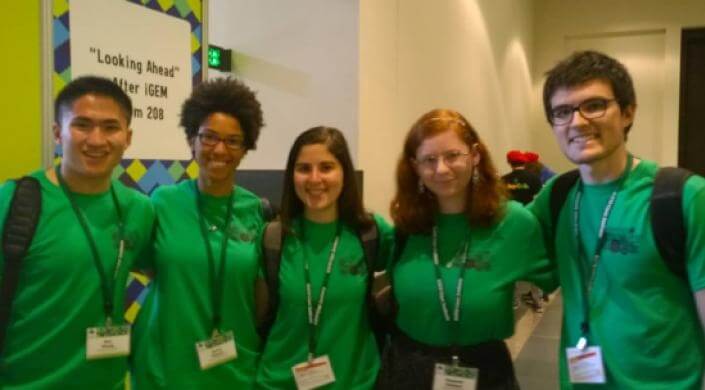News
The Harvard BioDesign team won a gold medal at the iGEM competition.
Billions of harmless Escherichia coli bacteria thrive in the human gut, but why aren’t the microbes flushed out of the intestines through digestion? Bacteria like E. coli produce pili, appendages resembling long strands of hair with sticky tips that adhere to intestinal surfaces.
If pili are one of the factors that enable E. coli to bind strongly to the intestines, could they be genetically modified to adhere to other types of tissue?
A team of students working at the Harvard John A. Paulson School of Engineering and Applied Sciences (SEAS) set out to answer that question by developing a synthetic biology project for the 2015 International Genetically Engineered Machine (iGEM) competition. The annual competition, held from Sept. 24 – 28 in Boston, challenged more than 200 teams of college and high school students to build biological systems that operate within living cells. The Harvard BioDesign Team won a gold medal for their project, BactoGrip, which is a modular and customizable platform that enables scientists to control the surfaces to which bacteria adhere.
The team, comprised of Ethan Alley, A.B. ’18, Lydia Goldberg, A.B. ’18, Elizabeth Hubbard, A.B. ’18, Sylvia Deppen, A.B. ’17, and Ben Zheng, A.B. ’18, and advised by Neel Joshi, associate professor of chemical and biological engineering, began working on the project in May. They decided to target colon cancer due to its the prevalence and severity—the disease is expected to kill about 50,000 people in the U.S. in 2015 and is the third leading cause of cancer-related deaths.
While research has been conducted on the use of bacteria to deliver therapies directly into cancer cells, a large gap still exists in understanding how the microbes could be targeted to adhere to only one particular type of cell, said Alley.
“If the bacteria could deliver a drug directly to the cancer cells, they could kill the cancer in a much more targeted way to avoid some of the side effects of broad treatments like chemotherapy, which also kill healthy cells,” he explained.
The team identified a peptide, a compound consisting of amino acids, which exists on colon cancer cells, but is not found on regular human cells. They used that peptide to genetically modify the structure of the protein in the tip of the pili, so the appendages would bind to colon cancer cells without adhering to the surrounding intestine.
Team members tested their work by placing human colon cancer cells on two pieces of paper. They washed one piece of paper with a solution containing their modified E. coli bacteria, and the other sheet of paper with an unmodified strain of bacteria. The preliminary tests showed that their modified E. coli did successfully bind to the cancer cells. Drawing on those encouraging results, the team members also engineered the pili to adhere to nickel and stainless steel, which could have uses in water testing or in the design of biomedical products.
They compiled their results into a series of BioBricks, “building blocks” of DNA sequences that can be used to assemble synthetic biology systems. Those BioBricks will be incorporated in to the Registry of Standard Biological Parts, so future iGEM teams and researchers from around the world can access their BactoGrip toolkit and incorporate it into future experiments.
“I hope that our team’s work can help provide a precedent for the use of engineered bacteria in cell-based therapy, and motivate research on how to deal with the safety concerns that arise with such systems,” said Goldberg, an applied math concentrator.
Joshi, who mentored the team along with graduate students Marika Ziesack, Matthew Niederhuber, Chris Wintersinger, and Isaac Plant, said he is proud of the students and excited about the potential contributions their project may provide for future research.
“This year's team has some exciting results that could be a springboard for a promising project to control the stickiness of beneficial bacteria in the gut and other places,” he said. “This is the second year running that Harvard has fielded an iGEM team, and we are excited to see it's popularity once again growing on campus. This is one of the few bioengineering oriented research experiences that is truly undergraduate driven, so we are looking forward to more undergrads getting involved in the organization and management of the team.”
2016 iGEM Team Now Recruiting Students
Are you a Harvard student interested in developing a synthetic biology project? The 2016 International Genetically Engineered Machine (iGEM) team is seeking undergraduate students. If you are interested, contact Neel Joshi, associate professor of chemical and biological engineering, or fill out this interest form.
Topics: Bioengineering
Cutting-edge science delivered direct to your inbox.
Join the Harvard SEAS mailing list.
Press Contact
Adam Zewe | 617-496-5878 | azewe@seas.harvard.edu



